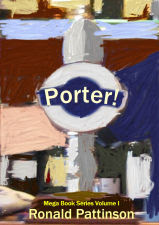Ads not shown when logged in
-
Automated Tracker

 Shut up about Barclay Perkins - Oat Porter
Shut up about Barclay Perkins - Oat Porter
Visit the Shut up about Barclay Perkins site
The Free Mash Tun Act opened the door for another ingredient, flaked oats. The first Oatmeal Stout, brewed by Maclay in Alloa in 1890s contained a whacking 30% of malted oats.
Brewers who followed the trend, most likely trying to dodge Maclay’s patent on Oat Malt Stout, usually went for flaked oats. In quantities so small, they could only have been for legal purposes. At no more than 1% of the grist, far too little to have any impact on the character of the beer.
No-one in London set up to brew an Oatmeal Porter. It was simply a side-effect of parti-gyling. As Porter usually shared its grists with the Stouts, there was simply no avoiding it, if you wanted to brew an Oatmeal Stout.
There never seems to have been an attempt to market this by-product. Perhaps because Oat Stout was usually a bottled product. And by this point Porter wasn’t usually bottled. A fact which probably hastened its demise. Stout, for example, managed to survive in bottled form long after draught versions disappeared.
With oats making up less than 1.5% of the grist at Truman, they were pretty typical of London brewers.
| Truman Runner grists 1880 - 1909 |
| Year |
OG |
lbs hops/ qtr |
hops lb/brl |
pale malt |
brown malt |
black malt |
crystal malt |
oats |
flaked maize |
caramel |
sugar |
| 1880 |
1056.8 |
12.8 |
3.84 |
44.15% |
11.13% |
4.45% |
|
|
|
|
40.27% |
| 1890 |
1058.2 |
9.1 |
2.50 |
66.77% |
10.02% |
6.01% |
|
|
|
|
17.20% |
| 1895 |
1057.6 |
7.1 |
1.92 |
65.33% |
10.89% |
6.82% |
|
|
|
|
16.97% |
| 1899 |
1058.2 |
7.3 |
1.99 |
56.17% |
11.70% |
7.83% |
|
|
10.01% |
|
14.30% |
| 1905 |
1054.3 |
5.8 |
1.35 |
63.91% |
7.58% |
5.13% |
|
|
9.57% |
3.19% |
10.63% |
| 1909 |
1058.2 |
8.2 |
2.31 |
67.30% |
5.66% |
5.41% |
5.41% |
1.47% |
2.60% |
4.05% |
8.10% |
| Sources: Truman brewing records held at the London Metropolitan archives, document numbers B/THB/C/082, B/THB/C/092, B/THB/C/096, B/THB/C/102, B/THB/C/108 and B/THB/C/112. |
You'll find more information that you'll ever need to know about Porter in my excellent book on the subject:
More...
Similar Threads
-
By Blog Tracker in forum Blog Tracker
Replies: 0
Last Post: 11-05-2019, 17:07
-
By Blog Tracker in forum Blog Tracker
Replies: 0
Last Post: 22-07-2014, 07:10
-
By Blog Tracker in forum Blog Tracker
Replies: 0
Last Post: 23-10-2012, 16:11
-
By Blog Tracker in forum Blog Tracker
Replies: 0
Last Post: 01-01-2011, 12:55
-
By Blog Tracker in forum Blog Tracker
Replies: 0
Last Post: 14-03-2010, 07:06
 Posting Permissions
Posting Permissions
- You may not post new threads
- You may not post replies
- You may not post attachments
- You may not edit your posts
-
Forum Rules





 Reply With Quote
Reply With Quote